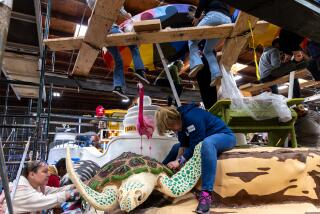Hush puppies replace drugs in Florida town : Everglades City returns to its fishing roots. Marijuana smugglers reigned during the early 1980s.
- Share via
EVERGLADES CITY, Fla. — More than 70,000 people found their way to this remote patch of high ground last weekend to hear country music star Little Jimmy Dickens; see clowns, football stars and racing pigs; and, for $5, enjoy a plateful of smoked mullet, hush puppies and coleslaw.
Legendary backcountry guide Loren G. (Totch) Brown was on hand too, autographing copies of his memoirs.
“This is a nice little town again, back to its roots as a fishing village,” Brenda Johnson was saying a couple of days after the visitors had gone home and the population of the only community on the western edge of Everglades National Park settled back down to about 450.
“That illegal activity had its time here, but people have learned their lessons and we’ve moved on. And I think our values are stronger now than ever.”
Johnson served as chairwoman of this year’s 22nd annual Everglades Seafood Festival, and that illegal activity she mentioned was drug smuggling. During the 1980s, this settlement, tucked into the mangrove trees behind the maze-like Ten Thousand Islands region of Florida’s southwest coast, was the perfect U.S. entry point for Colombian marijuana.
And the local shrimpers, crabbers and fishermen who knew these waters from boyhood were the perfect drug-runners to bring it in.
As more and more locals forsook stone crabs and mullet to fish for “square grouper”--bales of marijuana--the signs of sudden wealth rose up in bucolic Everglades City like tarpon in spring. Weather-weary trawlers were replaced by sleek cigarette-style racing boats. Pickup trucks were traded in for Lincolns with tinted windows. Men who seemed to have no steady job bought drinks at the Rod & Gun Club with $100 bills.
People noticed. The beginning of the end came in July, 1983, when a battalion of local, state and federal drug agents barricaded the only road into Everglades City and swooped in to town to seize 14 fishing boats, two airplanes, 500,000 pounds of marijuana and $5 million in assets.
Among the more than 200 Collier County people arrested were Totch Brown, his son and grandson; Brenda Johnson’s husband, Kit, and her two brothers-in-law; a former Florida Supreme Court justice, and a one-time deputy sheriff.
And that was just the start. Eventually, so many Everglades City fishermen were in jail, under indictment or busy with their lawyers that for several years, the fish served up during the Seafood Festival was frozen New England cod.
“I’m not proud of hauling marijuana,” says Brown, 74, an alligator hunter and commercial fisherman who served almost 19 months in federal prison on tax fraud and contempt convictions. “But when the pompano fishing went down, mullet prices fell, and someone tells you that you can make $10,000 for an hour’s work, the average man would have done the same thing.”
Assistant U.S. Atty. Russell Stoddard, who from his Ft. Myers, Fla., office has continued to prosecute scores more locals for drug smuggling well into the 1990s, scoffs at talk like that.
“They have romanticized and rationalized their past to make it almost folk culture,” he says. “In fact, they were responsible for bringing an enormous amount of marijuana into the U.S. Fathers testified against sons, wives against husbands. People were destroyed by this. People were killed. There was nothing romantic or pretty about it.”
Indeed, Stoddard estimates that as many as 100 local people are still in prison as a result of drug-related convictions, and the investigation of a 1989 car bombing that blew apart a potential witness in a drug case remains open.
Called Florida’s last frontier, Everglades City is just 30 miles south of Naples and 80 miles across the peninsula from Miami. But it remains as isolated as any place in the state. Ornaments found in shell mounds put the long-gone Calusa tribe in this region more than 1,000 years ago, but Everglades City was founded as a trading post in 1873. During the Florida land boom of the 1920s, wealthy Memphis advertising mogul Barron G. Collier envisioned Everglades City as a cross-coast rival to Miami and Palm Beach.
That never happened. Instead, Everglades City remained a rugged frontier outpost, the home of fishermen who through the years occasionally put down their nets and traps to trade in illegal bird plumes, Prohibition-era liquor, alligator hides and drugs. At the same time, the town also gained renown as a vacation retreat for moneyed industrialists, as well as Presidents Harry S. Truman, Dwight D. Eisenhower and Richard Nixon.
So is Everglades City’s era as a drug smugglers’ haven over?
“I truly hope so,” says Stoddard.
Johnson thinks it is. Her husband is back fishing for crabs. “I don’t known anyone around here who would go within five feet of anything illegal,” she says. “They don’t even speed.”
Times researcher Anna M. Virtue in Miami contributed to this story.
More to Read
Sign up for Essential California
The most important California stories and recommendations in your inbox every morning.
You may occasionally receive promotional content from the Los Angeles Times.













